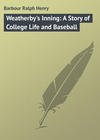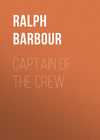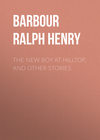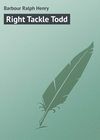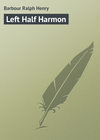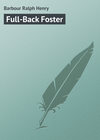Loe raamatut: «Left End Edwards», lehekülg 3
CHAPTER V
NUMBER 12 BILLINGS
The woods had given way to open fields, and they could follow with their eyes the course of the road ahead as it turned to the left and ran, almost parallel to the railroad, past where a pair of stone gate-posts guarded the entrance to the Academy. From the gate a drive went winding upward, hidden now and then by trees and shrubs, to where, at the crest of a hill, a half-dozen buildings looked down upon them with numberless windows.
"That's Main Hall," said Tom, "the big one in the centre. I remember it in the catalogue."
"And that's the gym at this end," added Steve. "It's a pretty good looking place, isn't it? What's the building where the tall chimney is, driver?"
"Torrence. There's rooms upstairs and a dining-room on the first floor. That chimney's from the kitchen at the back. Then the building in the middle's Main Hall, as they call it. That was the original building. I remember when there wasn't any others. The one to the left of it's Hensey Hall. The fellows that lives there are called 'Chickens,'" chuckled the man. "Then there's Billings beyond Hensey, and The Cottage, where Mr. Fernald lives, is just around the corner, like. You can see the porch of it if you look."
But they couldn't, for at that moment the carriage turned to enter the gate and their view was cut off by a group of yellowing beeches.
Presently the carriage stopped in front of a broad flight of stone steps and the boys climbed out.
"Fifty cents, gentlemen," said the driver as he lifted the bags out. "Thank you, sir. Thank you, sir! I'll have your trunks up first thing in the morning. Just walk right in through the door and you'll find the office on your right. They'll look after you there. Much obliged, gentlemen. Any time you want a rig or anything you telephone to Jimmy Hoskins. That's me. Good-night, gentlemen, and good luck to you!"
Steve had contributed an extra quarter, which doubtless accounted for Mr. Hoskins' extreme affability. Bags in hand they climbed the well-worn granite steps and entered a dim, unlighted corridor. An open door on the right revealed a room divided by a railing, in front of which were a half-dozen wooden chairs and beyond which were two desks, some filing cabinets, a book-case, a letter-press, some chairs and one small, middle-aged man with a shining bald head which was raised inquiringly as Steve led the way to the railing.
"How do you do, boys," greeted the sole occupant of the office in a thin, high voice. "What are the names, please?" As he spoke he took a card from a pile in front of him and dipped a pen in the ink-well.
"Stephen D. Edwards, sir."
"Full name, please."
"Stephen Dana."
"Very good. Place of residence?"
"Tannersville, Pennsylvania."
"A wonderful state, Pennsylvania. Parents' names, please."
"Charles L. Edwards. My mother isn't living."
"Tut, tut, tut!" said the school secretary regretfully and sympathetically. "A great misfortune, Edwards. Now, you are entering by certificate?"
"Yes, sir, from the Tannersville High School."
"And your age?"
"Fifteen; sixteen in–"
"Fifteen will do, thank you." He drew out a drawer in a small cabinet set at the left of the broad-topped desk and ran his fingers over the indexed cards within it, finally extracting one and laying it very exactly above the one on which he had been setting down the information supplied by Steve. For a moment he silently compared the two. Then he nodded with much satisfaction. "Quite so, quite so," he said. "You will room in Billings Hall, Number 12, Edwards. You are provided with linen and other articles required?"
"Yes, sir, but my trunk hasn't got here yet."
"Quite so. One moment." He drew a telephone toward him, pressed a button on a little black board set at one end of the desk, glanced at the clock between the two broad windows and spoke into the transmitter: "Mrs. Calder? Edwards, 12 Billings, hasn't his trunk yet. Will you have his room made up, please? Eh? Quite so! Yes, 12 Billings. Just a moment." He turned to Steve. "May I ask whether the young gentleman with you is your room-mate, Hall?"
"Yes, sir."
"And his trunk, too, is missing?"
"Yes, sir."
"Quite so. Yes, Mrs. Calder, both beds, please. Thank you." He hung up the receiver and pushed the instrument aside. "That is all, Edwards. I trust you will like the school. Should you want anything you may come to me here or you will find your Hall Master, Mr. Daley, in Number 8 Billings. Now, if you please, Hall."
Tom, in turn, answered the little man's interrogations and at last they were free to seek their room.
"Billings is the last dormitory to your right as you leave this building," said the secretary, "and you will find Number 12 on the second floor at the further end. Supper is served at six o'clock in the dining-room in Wendell, which is the last building in the other direction. As we have very few students with us yet, the supper hour is shortened and it will greatly assist if you will be prompt."
The boys thanked him and sought their room. A broad flagstone walk ran the length of the row of six buildings and along this they strode past the first building, which was Hensey, to the one beyond. The dormitories were uniform in material and style of architecture, each being three stories in height, the first story of stone and the others of red brick. The entrance was reached by a single stone step, above which hung an electric light just beginning to glow wanly in the early twilight. Inside, two slate steps led to the first floor level and here a fireproof door divided the staircase well from the corridor. A flight of stone stairs took them to the second floor. "Rooms 11 to 20" was inscribed on the door and Steve pushed it open and led the way down to a very clean, well-lighted corridor to Number 12. There could be no mistake about it, for the figures were very plainly printed on the white door. Under the room number was a little metal frame which they afterwards discovered was for the purpose of holding a card bearing the names of the occupants. Steve pushed the door open and, followed by Tom, entered.
There was still enough light from the one broad window to see by, but Steve found a switch near the doorway and turned on the electricity. It was a pretty forlorn looking place at first glance, but doubtless the fact that the two beds were unmade, that the window-seat was empty of cushions and that the two slim chiffoniers and the desk-table were bare had a good deal to do with that first impression. The boys set their bags down and looked about them rather dejectedly. Finally,
"I suppose when we get our things around it'll look different," murmured Tom.
Steve grunted and tried a bed. "That feels pretty good," he said. "I hope Mrs. Thingamabob won't forget to make it. Which side do you want?"
"I don't care," replied Tom. "There isn't any difference, I guess."
There didn't appear to be. The door was at the right as you entered, and beside it was a good-sized closet. The room was about fifteen feet long, from closet to window, by some twelve feet wide. A brown grass rug filled most of the floor space. The wainscoting, of clean white pine, ascended four feet and ended in a narrow ledge or shelf, devised, as they afterwards discovered, to hold photographs or small pictures which the rules prohibited them from placing on the walls. The walls were painted a light buff. The furniture consisted of two single-width beds, two chiffoniers, a study table and two straight-backed chairs. The beds were against the opposite walls, the table in the geometrical centre of the rug, the chiffoniers occupied a portion of the remaining wall space on each side and the two chairs were set between beds and bureaus. The window was in a slight bay and there was a six-foot seat below it. The room was lighted by a two-lamp electrolier above the table, but from one socket depended a green cord, suggesting that a previous occupant had used a drop light.
"I wonder," said Steve, "where we are supposed to wash."
"Let's look for the bathroom," suggested Tom. So they returned to the silent corridor and presently discovered a commodious bath and wash-room at the farther end. There were six set bowls and four tubs there, and Tom thought it was pretty fine. Steve, however, was in a mood to find fault and he objected to the bathroom on several different counts. For one thing, it was too far away. Then, too, he didn't see how twenty fellows were going to wash at six bowls. Tom, however, promptly demonstrated how one fellow could do it by returning to Number 12 and bringing back his wash-cloth. In his absence Steve had been experimenting with the liquid soap apparatus with which each bowl was supplied, and by the time Tom got back was able to tell him why he didn't approve of them! By the time they had both cleaned up it was time to find the dining-hall, and so, leaving the light burning in brazen disregard of a notice under the switch, they clattered downstairs again and set off for the other end of the Row, as the line of buildings was called.
Two or three boys were standing on the steps of Wendell when they reached it and they were aware of their frankly curious gaze as they passed them. The dining-hall wasn't hard to find, for its double doors faced them as they entered the building. They left their caps on one of the big racks outside and rather consciously stepped inside the doorway. It was a huge room, seemingly occupying the entire first floor of the building, and held what appeared to be hundreds of tables. Only four of them were occupied now, two across the hall from the door and two at one end. A boy of about seventeen or eighteen, wearing an apron and carrying a tray of dishes, saw them, and, setting down his burden, conducted them to one of the tables nearby. There were already five boys at the board and they each and all stared silently while Steve and Tom slid into their chairs. The newcomers surmised that they, too, were new boys, for, unlike the fellows at the next table beyond, who were laughing and chatting quite light-heartedly, they applied themselves grimly and silently to their food and seemed to view each other with deep distrust.
Steve and Tom, striving against the embarrassment that held them, conversed together in whispers. "It's a whaling big room," said Steve. "Just like a hotel, isn't it? Wonder what we get to eat."
"Bet you I'll eat it, whatever it is," replied Tom. "I'm as hungry as a bear!"
They weren't left long in doubt, for a second waiter appeared very promptly and set their repast before them. There was cold roast beef, a baked potato apiece, toasted muffins, milk and cocoa, preserves and cookies. By the time they were half through their supper most of the others had finished and hurried away, removing much of the embarrassment of the situation. Steve ventured to stretch his legs comfortably under the table and turn his head to regard the occupants of the tables at the far end of the hall.
"I guess some of those are teachers," he said. "Gee, but I'd like some more meat. Would you ask for it?"
"I don't know. No one else did. These muffins are bully, only there aren't enough of them. I wonder if we'll sit here regularly."
"I don't suppose so. We'll probably be shoved to one of those tables over there by the wall. What time do you suppose they have breakfast? We'll have to ask someone, I guess. Didn't he say something about a Hall Master?"
"Yes, in Number 8. We'll stop and ask him when we go back." There was a scraping of chairs at the end of the room and several older boys and two or three men came down the room toward the door. Steve and Tom turned to look and suddenly Tom seized his companion's arm.
"It's him!" he exclaimed.
"Who?" asked Steve.
"Or—anyway it looks lots like him," continued Tom breathlessly.
"Who looks like what?" demanded the other impatiently.
"Why, the tall fellow just going out now! See him? He—he looks just like the fellow in the station, the fellow who took your bag! The confidence-man!"
CHAPTER VI
CLUES!
"The confidence-man?" asked Steve incredulously. "Oh, you run away and play, Tom! What would he be doing here? Don't be a silly goat!"
"Well, I suppose it isn't he, but—but he certainly looked just like him."
"Pshaw, I saw him too, didn't I? Well, that chap doesn't look anything like him."
"Then you didn't look at the fellow I meant," returned Tom doggedly. "I—I believe it was he, Steve!"
"Oh, sure," said Steve sarcastically, "and the fellow behind him is a famous second-story burglar and the man with the flannel trousers on, who looks like a teacher, is a popular murderer. He escaped from Sing Sing this morning. And the little man with the grey moustache–"
"That's all right," replied Tom earnestly, "but you'll find I'm right. It—it was he, I tell you! There couldn't be two people as much alike!"
"You'd better follow him then," laughed Steve, "and ask him for my suit-case. Tell him I want my pajamas, will you?"
But Tom refused to treat the matter so lightly. He was evidently quite convinced that he was really on the trail of the thief, and all Steve's ridicule failed to move him from that conviction. He was too anxious to begin the search for the "confidence-man" to do justice to the rest of his supper, and when, at last, they were once more outside the building he gazed up and down the Row eagerly and was disappointed to find that neither his quarry nor anyone else was visible in the half-darkness. As they passed Torrence Hall, however, an open window on the first floor sent a flood of light across the walk, and Tom, crossing the narrow strip of turf that divided building from pavement, raised himself on his tiptoes and looked into the room. The next instant a face appeared with disconcerting suddenness within a foot of his own and the occupant of the room, who had been reclining on the window-seat, enquiring abruptly:
"Well, fresh, what do you want?"
"N-Nothing, thanks," stammered Tom, withdrawing quickly.
"Keep your head out of my window then," was the indignant response, "or I'll come out there and teach you manners!"
Tom hurried away into the friendly darkness and joined Steve, who was chuckling audibly.
"Did you find him, Tom?"
"No." And then, as Steve continued to be amused, Tom said with spirit; "I should think you'd be enough interested to help a fellow instead of giggling like a silly goat!"
"Oh, I'm not a Sherlock Holmes," replied Steve airily. "Detecting isn't in my line."
"I should think you'd want to get your bag back, though. I tell you that was really the fellow, Steve. Don't you believe me?"
"Oh, yes!"
"You don't, though," said Tom bitterly. "All right, then. You find your own bag. I'm through."
"Oh, don't say that!" begged Steve. "You were doing so nicely. Look, there's a lighted window up there, Tom. If you get a ladder now–"
"Aw, cut it!" growled Tom.
Mr. Daley was in when they rapped at the door of Number 8, on the first floor of Billings, and, accepting his invitation to enter, they found themselves in a very cosy, lamp-lighted, nicely furnished study, from which a smaller room, evidently a bedroom, opened. Mr. Horace Daley was a young man with an embarrassed manner and a desire to appear quite at ease. He shook hands heartily, stumbled through a few words of welcome and arranged chairs for them. He asked a good many questions, invariably remarking "Fine!" with deep enthusiasm after every answer and smiled jovially at all times. But the boys saw that he was much more embarrassed than they were and were secretly pleased and amused. When at last the instructor had finished the usual questions and was searching around in his mind for more, Steve began asking for information. Breakfast, responded Mr. Daley, was at seven-thirty and ran half an hour. Chapel was at eight-fifteen usually, although there would be none to-morrow, as school did not officially begin until noon. The first recitation hour was nine o'clock. Dinner ran from twelve-thirty to one-thirty. Recitations began again at two and lasted until half-past three. Supper was at six. Between seven and eight the students were required to remain in their rooms and study, although on permission of the House Master one could study in the library instead. All lights were supposed to be out at ten-thirty. And Mr. Daley hoped the boys would get on swimmingly and become very fond of Brimfield.
"I—ah—I want you to feel that I am ready and anxious to help you at any time, fellows. I—ah—want you to look on me as—ah—as a big brother and come to me in your—ah—perplexities and troubles, should you have any, and of course there are bound to be—ah—little worries at first. One has to accustom oneself to any—ah—new environment. Don't hesitate to call on me for advice or assistance. Sometimes an older head—ah—you see what I mean?"
Steve replied that they did and thanked him and, with Tom crowding at his heels, withdrew.
"He's a funny dub," confided Steve, as they made their way up to the next floor. "Guess he must be new here. What does he teach, Tom?"
"Modern languages, I think the catalogue said. His first name is Horace."
"Horace!" Steve chuckled. "It ought to be Percy. Hello, they've fixed the beds up."
The room looked far more habitable when Steve had switched the light on. Tom sighed luxuriously as he stretched himself out on one of the beds. "Bet you I'm going to do a tall line of sleeping to-night, Steve," he said. "This bed isn't half bad, either."
"Well, don't put your feet all over the spread," replied Steve. "Get up out of that and unpack your bag, you lazy duffer."
"I will in a minute. I'm tired. Say, what do you think of this place, anyway, Steve?"
"The school? Oh, I guess it'll do. You can't tell much about it yet, I suppose. I'm going to snoop around to-morrow after breakfast and see the sights. I suppose things will be a lot different when the crowd comes. I guess we're the only fellows in this dormitory to-night."
"Scared?" asked Tom, with a grin. "Remember Horace is downstairs to protect you."
"Huh! Bet you he'd crawl under the bed if he saw a burglar! I wonder if the rest of the faculty is like him."
"Oh, I dare say he's all right when you get to know him," said Tom, with a yawn. "Say, pull down that window, Steve. It's getting chilly in here."
"Get up and move around and you won't feel chilly," replied Steve unsympathetically. "Gee, I wish I had my pajamas and things."
"You might have had them by this time if you'd helped me look for that fellow," said Tom. "I'm just as certain as I am that I'm lying here that the fellow we saw in the dining-hall was the fellow who swiped your suit-case!"
"Oh, forget that," said Steve disgustedly. "Common-sense ought to tell you that a sneak thief you saw in New York wouldn't be having his supper here at Brimfield!"
"He was, though," replied the other stubbornly.
"Oh, run away! Don't you suppose there are two people who look alike in this world?"
"Not as much alike as those two."
"Why, you didn't even get a good look at the fellow in the dining-hall. He had his back turned to you."
"Not when I saw him first, he didn't," answered Tom with a vigorous shake of his head. "I saw his face before he turned at the doorway and it was him!"
"You mean it was he, you ignoramus. All right, Tom, have your own way about it. Only someone ought to warn the principal about him. Why, he might run off with a couple of the buildings some night!"
"Enjoy yourself," murmured Tom. "But you'll find I was right some day, you old pig-headed chump!"
"When I do I—I'll make you a present," answered Steve, with a grin.
"Any present you'd give me wouldn't cut much figure, I guess," said the boy on the bed contemptuously.
"Is that so? Say, what'll I do with this bag?" Steve laid the suit-case in question on his bed and threw open the lid. "The pajamas look clean, anyway," he continued as he viewed them. "I suppose I'll have to wear them." He drew the cap out and set it on his head. "Wonder what the B stands for, Tom."
"What bee?" asked Tom lazily.
"The B on this cap," replied the other, studying it.
Tom suddenly sat up on the bed. "Why, Brimfield, of course!" he exclaimed in triumph. "There now! Was I right or wasn't I?"
"Shucks! It might stand for anything: Brown, Brooklyn, beans, brownbread, basketball–"
"Yes, and Brimfield! And aren't the Brimfield colours maroon-and-grey, and isn't that cap grey, and isn't that B maroon?"
"It's red."
"So is maroon, a brownish-red." Tom had deserted his bed and was turning the cap about eagerly. "This belongs to some fellow here who has won his letter, Steve," he said with deep conviction.
"Some fellow who has lost his letter, you mean," replied Steve with a laugh. "All right; it will save me from buying a cap when I make the football team. How does it look on me?"
"It's too big," said Tom. "It's about a seven, I guess. That's what that fellow would wear, I think." Tom frowned thoughtfully. "Are there any more clues?" he asked, dropping the cap and seizing the pajamas excitedly.
"Sure! There are brushes in the case and they mean that the fellow has hair on his head, Tom. So there's no use looking for a bald-headed man, eh? That's what they call 'the process of elimination,' isn't it? Say, what are you trying to do with those things? Ruin them? Please remember that I've got to wear them to-night."
"Looking for laundry marks," replied Tom. "But there aren't any. I guess they're new ones." He dropped the pajamas regretfully and turned his attention to the other objects in the bag. "A magazine," he muttered.
"'Fine'!—as Horace would say. The man can read. Therefore he is not blind. Elimination again! At this rate we'll know all about him in a minute, Tom. Gee, but you're a wise guy. Have a look at the collar and tell me the fellow's name. Go on!"
"It begins with an M, anyway," muttered Tom, studying the object in question.
"Ha!" exclaimed Steve melodramatically. "The net is closing! He has hair on his head, is not blind, wears purple pajamas and spells his name with an M! The rest is easy, Tom. Put your hat on and we'll go out and get him."
"Oh, shut up, you silly goat!" Tom had the magazine in his hands again and was glancing through it. Suddenly, with an exclamation, he thrust it into Steve's hands. "There! Hold it up and let it fall open itself, Steve!"
"All right. What about it?"
"Look where it opened!"
"Page 64."
"Yes, but what's there?"
"'Men Who Have Made Football History, by–'"
"There you are! Don't you see! That's what he was reading. He's a football man and that B is his football letter!"
"Oh! But, say, Tom, you're forgetting that this suit-case is supposed to have been stolen from someone else. Then what?"
"We don't know that it was. We just thought so. It looks now as if it really belonged to the fellow."
"And he went and swapped it for mine? What would he do that for?"
"Maybe he thought yours might have something valuable in it," faltered Tom. "Maybe—say, Steve, perhaps he got yours by mistake!"
"Sure!" replied the other sarcastically. "Reached down and dragged it from under your feet, thinking all the while it was his. Sounds very probable—I don't think!"
"Well, you can see for yourself–"
"What was that?" interrupted Steve.
"What was what?"
"I thought I heard a knock at the door." They listened. It sounded again. Steve hustled the things back into the bag and slammed the lid shut in a twinkling. Then, "Come in!" he called.
The door opened and a tall youth stepped inside. He carried a suit-case in one hand. Tom gasped. It was the "confidence-man"!













